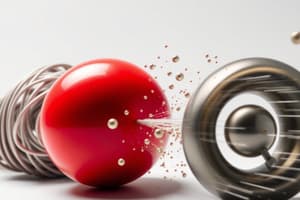Podcast
Questions and Answers
What is the primary characteristic of mass?
What is the primary characteristic of mass?
- It has a direction in space.
- It measures the amount of matter in a body. (correct)
- It is measured in newtons.
- It is a vector quantity.
What is the SI unit of mass?
What is the SI unit of mass?
- Kilogram (correct)
- Newton
- Gram
- Pound
How is momentum calculated?
How is momentum calculated?
- p = mass + velocity
- p = mass × velocity (correct)
- p = mass - velocity
- p = mass / velocity
If a 70 kg skateboarder moves west at 4 m/s, what is his momentum?
If a 70 kg skateboarder moves west at 4 m/s, what is his momentum?
What does the conservation of momentum state in a closed system?
What does the conservation of momentum state in a closed system?
Which physical principle describes the behavior of a spacecraft accelerating by expelling gas?
Which physical principle describes the behavior of a spacecraft accelerating by expelling gas?
What type of collision is commonly used to demonstrate the conservation of momentum in physics?
What type of collision is commonly used to demonstrate the conservation of momentum in physics?
What is the relationship between velocity and directional momentum?
What is the relationship between velocity and directional momentum?
What is the relationship between force and acceleration in a system?
What is the relationship between force and acceleration in a system?
What must be kept constant to ensure that changes in acceleration are due solely to the applied force?
What must be kept constant to ensure that changes in acceleration are due solely to the applied force?
How is acceleration due to gravity calculated in the described experiment?
How is acceleration due to gravity calculated in the described experiment?
What is the primary purpose of using a dense metal sphere in the experiment?
What is the primary purpose of using a dense metal sphere in the experiment?
What principle is demonstrated by the collision between two spheres in the experiment?
What principle is demonstrated by the collision between two spheres in the experiment?
What adjustment is important for ensuring constant velocity in the trolley experiment?
What adjustment is important for ensuring constant velocity in the trolley experiment?
When conducting the momentum experiment, what happens to trolley A after the collision?
When conducting the momentum experiment, what happens to trolley A after the collision?
How can the accuracy of the trolley experiment be improved?
How can the accuracy of the trolley experiment be improved?
What happens to the net force when the total forces acting on an object are balanced?
What happens to the net force when the total forces acting on an object are balanced?
What mathematical relationship describes the acceleration of a body under the action of force?
What mathematical relationship describes the acceleration of a body under the action of force?
For the experiment measuring the distance from the sphere to the trapdoor, what is crucial for precision?
For the experiment measuring the distance from the sphere to the trapdoor, what is crucial for precision?
Why should external forces be minimized during the experiment with the falling sphere?
Why should external forces be minimized during the experiment with the falling sphere?
What type of graph is used to analyze the relationship between distance and time squared?
What type of graph is used to analyze the relationship between distance and time squared?
What forces must be measured to calculate the net force on the golfer's trolley?
What forces must be measured to calculate the net force on the golfer's trolley?
What is the primary reason objects of different masses fall at the same rate in a vacuum?
What is the primary reason objects of different masses fall at the same rate in a vacuum?
How is weight defined in relation to an object's mass?
How is weight defined in relation to an object's mass?
What two forces must be balanced for a skydiver to reach terminal velocity?
What two forces must be balanced for a skydiver to reach terminal velocity?
What key factor affects the acceleration due to gravity (g) at different altitudes on Earth?
What key factor affects the acceleration due to gravity (g) at different altitudes on Earth?
Which statement about friction is false?
Which statement about friction is false?
What is the net force acting on a 30 kg block being pulled with an applied force of 250 N, with a frictional force of 70 N?
What is the net force acting on a 30 kg block being pulled with an applied force of 250 N, with a frictional force of 70 N?
What must be true about the forces acting on an object at rest on a flat surface?
What must be true about the forces acting on an object at rest on a flat surface?
To maintain constant velocity while traveling uphill, the force generated must overcome which opposing forces?
To maintain constant velocity while traveling uphill, the force generated must overcome which opposing forces?
What does the gravitational force on Earth depend on?
What does the gravitational force on Earth depend on?
What is indicated by the term 'terminal velocity'?
What is indicated by the term 'terminal velocity'?
When conducting an experiment, how should mass and weight be differentiated?
When conducting an experiment, how should mass and weight be differentiated?
What role does a lubricant play in the context of friction?
What role does a lubricant play in the context of friction?
What is the relationship between acceleration due to gravity and distance from the Earth's center?
What is the relationship between acceleration due to gravity and distance from the Earth's center?
What is the velocity of the yellow puck after the collision?
What is the velocity of the yellow puck after the collision?
What is the combined speed of the skier and snowboarder after the collision?
What is the combined speed of the skier and snowboarder after the collision?
Which of the following correctly defines a newton?
Which of the following correctly defines a newton?
According to Newton's first law, what happens to a body at rest?
According to Newton's first law, what happens to a body at rest?
Which equation represents Newton's second law?
Which equation represents Newton's second law?
How does doubling the distance between two masses affect the gravitational force between them?
How does doubling the distance between two masses affect the gravitational force between them?
What is impulse in physics?
What is impulse in physics?
What happens when a football is kicked with more force?
What happens when a football is kicked with more force?
What is the SI unit of impulse?
What is the SI unit of impulse?
How does gravitational force behave according to Newton's law of universal gravitation?
How does gravitational force behave according to Newton's law of universal gravitation?
Which of Newton's laws states that for every action, there is an equal and opposite reaction?
Which of Newton's laws states that for every action, there is an equal and opposite reaction?
What will happen to the momentum of an object if its velocity is doubled and its mass remains constant?
What will happen to the momentum of an object if its velocity is doubled and its mass remains constant?
What force is required to lift a 10 kg object against gravity?
What force is required to lift a 10 kg object against gravity?
What phenomenon relates to the conservation of momentum when two bodies collide and stick together?
What phenomenon relates to the conservation of momentum when two bodies collide and stick together?
What is the relationship between force, mass, and acceleration according to Newton's second law?
What is the relationship between force, mass, and acceleration according to Newton's second law?
What is the unit of measurement for impulse?
What is the unit of measurement for impulse?
Which factor does NOT affect the acceleration due to gravity at different locations on Earth's surface?
Which factor does NOT affect the acceleration due to gravity at different locations on Earth's surface?
How does momentum behave during a collision between two objects?
How does momentum behave during a collision between two objects?
What happens to an object in free fall in a vacuum?
What happens to an object in free fall in a vacuum?
What is the significance of calculating the normal reaction force on an inclined surface?
What is the significance of calculating the normal reaction force on an inclined surface?
How does friction affect the motion of a car on a level road?
How does friction affect the motion of a car on a level road?
What does terminal velocity indicate about the forces acting on a falling object?
What does terminal velocity indicate about the forces acting on a falling object?
What occurs to gravitational force when the distance between two masses doubles?
What occurs to gravitational force when the distance between two masses doubles?
Which equation represents the calculation of the net force acting on a block being pulled across a surface?
Which equation represents the calculation of the net force acting on a block being pulled across a surface?
What will happen to the momentum of a 70 kg skateboarder moving west at 4 m/s?
What will happen to the momentum of a 70 kg skateboarder moving west at 4 m/s?
Why does a spacecraft keep moving to the moon after its engines are turned off?
Why does a spacecraft keep moving to the moon after its engines are turned off?
What do smooth surfaces typically do in terms of friction?
What do smooth surfaces typically do in terms of friction?
How can the mass of a system be calculated from the slope of a force vs. acceleration graph?
How can the mass of a system be calculated from the slope of a force vs. acceleration graph?
What is the primary reason the value of g varies at different locations on the Earth's surface?
What is the primary reason the value of g varies at different locations on the Earth's surface?
Which of the following best describes Newton’s law of universal gravitation?
Which of the following best describes Newton’s law of universal gravitation?
When a spacecraft's engines are turned off during flight, why does it continue towards the moon?
When a spacecraft's engines are turned off during flight, why does it continue towards the moon?
What is a defining characteristic of momentum as a physical quantity?
What is a defining characteristic of momentum as a physical quantity?
What is the SI unit of force and how is it defined?
What is the SI unit of force and how is it defined?
In an experiment to determine the acceleration due to gravity, what is typically the method used to measure time?
In an experiment to determine the acceleration due to gravity, what is typically the method used to measure time?
Which statement correctly describes friction in a physics context?
Which statement correctly describes friction in a physics context?
What is the relationship described by Newton's first law of motion?
What is the relationship described by Newton's first law of motion?
How is impulse defined in relation to momentum?
How is impulse defined in relation to momentum?
What does the principle of conservation of momentum state?
What does the principle of conservation of momentum state?
When does gravitational force between two masses increase?
When does gravitational force between two masses increase?
How is the loss of kinetic energy during a collision accounted for?
How is the loss of kinetic energy during a collision accounted for?
What happens to the forces acting on a book that decelerates on a horizontal table?
What happens to the forces acting on a book that decelerates on a horizontal table?
What distance is the acceleration due to gravity observed to be approximately equal to on Earth?
What distance is the acceleration due to gravity observed to be approximately equal to on Earth?
Flashcards are hidden until you start studying
Study Notes
Mass and Momentum
- Mass measures the amount of matter in a body, quantified using kilograms (kg), which is an SI unit.
- It represents an object's resistance to acceleration (inertia) and interacts with gravitational forces.
- Momentum (p) is a vector quantity defined as the product of mass and velocity (p = mass × velocity); its unit is kg·m/s.
- Total momentum in a closed system before an interaction is equal to total momentum after.
Calculating Momentum
- For a skateboarder with a mass of 70 kg moving at 4 m/s, momentum is calculated as p = 70 kg × 4 m/s = 280 kg·m/s west.
- The conservation of momentum applies in all directions without external forces; this principle also applies to spacecraft propulsion and collisions, like in snooker.
Conservation of Momentum
- In a head-on collision between two identical hockey pucks, if one puck stops, the other puck's velocity can be determined using conservation principles.
- In a collision between a skier (90 kg) at 10 m/s and a snowboarder (60 kg) at -5 m/s, they move together at a combined speed of 4 m/s after colliding.
Force
- A force is also a vector quantity, measured in newtons (N), where 1 N = 1 kg·m/s².
- Newton's three laws of motion frame force concepts:
- Law 1: Objects stay still or move uniformly if no net force acts on them.
- Law 2: Change in momentum relates to applied force; expressed as F = ma.
- Law 3: For every action, there is an equal and opposite reaction.
Impulse and Gravitational Force
- Impulse (I) is the change in momentum, measured in newton-seconds (Ns), and acts in the direction of the applied force.
- The gravitational force acts between masses, following Newton's Law of Universal Gravitation, which states gravitational force is proportionate to mass and inversely related to the square distance between their centers.
Weight and Acceleration
- Weight is a force representing gravitational pull on mass, measured in newtons; weight (W) = mass (m) × acceleration due to gravity (g).
- Acceleration due to gravity on Earth is approximately 9.8 m/s², consistent across objects but varies based on distance from Earth's center.
Friction and Terminal Velocity
- Friction opposes motion between two surfaces and increases with velocity; it enables controlled movement or stopping.
- At terminal velocity, downward weight equals upward air resistance, leading to constant falling speed.
Experimental Setup and Observations
- Experiments illustrate conservation of momentum, using trolleys or pendulums, measuring pre and post-collision velocities.
- Precautions in experiments include minimizing friction and using consistent masses.
Related Questions and Calculation Examples
- Common problems involve calculating net force, acceleration, and momentum through various scenarios, often applying F = ma and concepts of impulse and momentum conservation.
- Real-life examples include a golfer's trolley dynamics and projectile motion of a golf ball, needing to consider angles and forces during calculations.
Understanding Gravity Variations
-
Gravity varies across Earth's surface due to shape and mass distribution; potential exam questions will address effects of altitude and location on gravitational acceleration.### Physics Concepts and Principles
-
Forces on a Skydiver:
- Gravitational force acts downward (weight).
- Air resistance acts upward (drag).
- At constant velocity, gravitational force equals air resistance, resulting in zero net force.
-
Newton's Law of Universal Gravitation:
- States that every point mass attracts every other point mass with a force proportional to the product of their masses and inversely proportional to the square of the distance between their centers.
- Formula: ( F = G \frac{{m_1 m_2}}{{r^2}} )
-
Acceleration due to Gravity at Height:
- At a height equal to twice the radius of Earth, gravitational acceleration can be calculated using ( g' = g \frac{{R^2}}{{(R+h)^2}} ), with ( h = R ).
- Results in ( g' = \frac{g}{4} ) (where ( g = 9.81 , \text{m/s}^2 )).
-
Spacecraft Motion:
- Spacecraft continues to the moon due to inertia, as per Newton's First Law, which states an object in motion stays in motion unless acted upon by an external force.
-
Lack of Atmosphere on the Moon:
- The moon's low gravity (approximately 1/6th of Earth) cannot hold an atmosphere securely.
- Solar wind and lack of magnetic field contribute to the absence of an atmosphere.
Friction and Motion
-
Definition of Friction:
- Friction is the force opposing relative motion between two surfaces in contact.
-
Factors Affecting Friction:
- Increases with the weight of the object.
- Varies based on the texture and materials of the surfaces.
-
Force on a Car:
- Engine force: 2.0 kN leading to acceleration of 1.2 m/s².
- Net force calculated from Newton's second law.
- Friction counteracts motion and cannot exceed the engine's force.
Experiments in Physics
-
Measuring Acceleration:
- Acceleration can be measured by plotting a graph of force against acceleration.
- The slope of the line can be used to find mass.
-
Conservation of Momentum:
- Total momentum before a collision equals total momentum after in a closed system.
- Example: A collision between two bodies shows momentum conservation by equating the mass and velocity before and after.
-
Gravity Experiments:
- Use a ball to measure the time it takes to fall through a certain distance.
- The slope of a distance vs. time squared graph gives the value of gravitational acceleration.
Key Formulas and Definitions
-
Momentum:
- Definition: Momentum (p) is given by ( p = \text{mass} \times \text{velocity} ).
-
Newton's Laws:
- First Law: An object remains at rest or in uniform motion unless acted upon by a net force.
- Second Law: The acceleration of an object is proportional to the net force acting on it and inversely proportional to its mass (( F = ma )).
-
Defining Units:
- SI unit of mass is the kilogram (kg).
- One Newton is defined as the force needed to accelerate a mass of 1 kg by 1 m/s².
Impact of Variables on Physics Principles
-
Changes in Momentum:
- Momentum conservation applies in collisions; total before equals total after.
- The direction affects calculations as momentum is a vector quantity.
-
Atmospheric Effects:
- Weightlessness occurs in a vacuum as there are no air resistance effects.
- Varying gravitational acceleration on Earth's surface due to mass distribution and altitude changes.
-
Experimental Errors:
- Graphs not passing through the origin indicate systematic errors or external forces not accounted for.
- Using dense objects minimizes air resistance for accurate free-fall measurements.
Important Relationships
-
Acceleration due to Gravity:
- Lower at greater distances from Earth's center; factors include altitude and Earth's non-uniform shape.
-
Friction's Role:
- Essential for traction but acts against motion, influencing speed and acceleration outcomes on surfaces.
Each topic presents essential physics concepts and their practical implications, useful for studying the principles underlying motion, force, and gravitational effects.
Studying That Suits You
Use AI to generate personalized quizzes and flashcards to suit your learning preferences.




